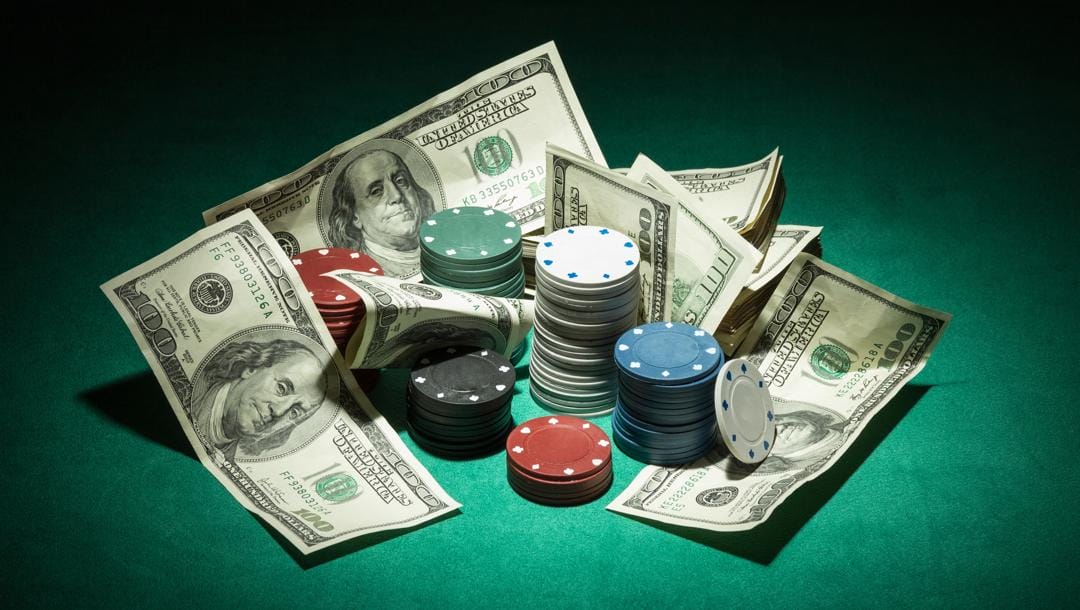Few things sharpen the mind more than a good live cash poker game. The atmosphere is intense as you face your opponent directly across the green baize, knowing that every decision you make could win or lose you real cash money. With their deep stacks, strategic challenges and constant money pressure, live cash games are completely different from poker tournaments, let alone chance-based online casino games! As a result, live cash players are prone to making the same kinds of mistakes. We’ve profiled five of the most common ones to help you learn how to play poker for cash, both live and online.
What Are Cash Games in Poker?
Also known as ring games, cash games are simply poker games in which the chips represent real money. Cash games don’t have any designated starting or stopping time. You can simply buy into a game and leave any time you want. Casinos tend to have live cash games with different table limits catering to every budget. For example, the MGM Grand has plenty of $1/$3 and $2/$5 no-limit Texas hold’em poker games, which are popular with low-stakes players. If you’re looking for higher table limits, head for a venue such as the Bellagio, with its non-stop high-stakes cash game in the Big Game Room. If you’d rather play from the comfort of home, plenty of online poker sites offer cash games.
Cash Games Versus Poker Tournaments

The difference between cash games and poker tournaments is that in tournaments, the winner takes all and the losers don’t lose anything more than their buy-in. In cash games, players win and lose real money all the time. What’s more, cash games tend to be deep-stacked, which calls for a different kind of strategy. Short stacks mean that tournament players often only have to make decisions before and on the flop, while cash players have to make decisions all the way to the river. As a result, cash players have to go for value and push the margins all the time. This makes for exceptionally challenging play!
1. Playing Scared
One of the most common mistakes cash players make is to let fear influence their play. Fear of what? Fear of getting stacked and losing all their money, that’s what! It’s only natural, but it can have serious negative consequences, too. If you play scared, you aren’t going to be at the top of your game. In the long term, this will impact your profits. The fact of the matter is that you need to accept that your decisions will sometimes make you money and other times will lose you money. Poker is all about pushing the margins over long periods. To maximize value in the long term, you have to make peace with frequent losses in the short term. Avoid making strategically poor decisions just because you’re scared to lose money. These decisions will backfire and you’ll simply be exploited. Rather focus on playing the best you can at all times.
2. Playing Too Sloppy Pre-flop
Beginner cash players are notorious for acting too passive, calling too much and generally playing too loose pre-flop. This is a mistake. Most times, unless you’re in the big blind position or on the button, the best strategy when facing a raise is not to call but to either fold or 3-bet. That’s because you don’t have great pot odds to call, especially against large raises. What’s more, multiple players behind you can put the squeeze on and 3-bet you out of the pot. So go big or go home! Play decisively and don’t throw money away with sloppy play.
3. Bloating the Pot With Medium Hands
A common error in cash games is the tendency to throw money into the pot while holding medium-strength hands. An example would be a jack of diamonds and ten of diamonds on a jack of spades, eight of spades and six of spades. It’s a solid hand to start with but loses in strength when more bets and raises go into the pot. It’s better to play medium-strength hands as bluff catchers, that is, hands that aren’t good for value betting but win by calling players’ bluffs. It’s usually best to check at least one street with a medium-strength hand. If your opponent shows weakness by checking back or checking to you twice, your hand’s value increases and you can start betting to extract value.
4. Not Paying Attention to Stack Depth

When it comes to online poker tournaments, stack depth is everything. It’s just as important in cash games, but for some reason, cash players tend to pay less attention to stack depth than tournament players. Maybe it’s because the disparity in stack sizes tends to be less in cash games as players buy more chips. Whatever the reason, the fact is that successful cash players know to let stack depth dictate their pre-flop re-raising strategy. When playing deep, use larger 3-bet sizes and avoid giving your opponents the kind of pot odds that enable them to call with marginal hands. When playing short, use 3-bet or 4-bet sizes that leave room for folding later on. This will allow you to include bluffs in your range without having to commit to the pot.
5. Bluffing Too Little
Not bluffing enough can take the edge off your value bets because opponents will start to read you and fold more often to your bets. One way to prevent this is to think about what hands you would bluff within the same spot where you’re making a value bet. Ask yourself what size bet (expressed as a percentage of the pot) you’ll use on the river and apply this formula:
Bluffing frequency = Bet size / (1 + Bet size * 2)
This will help you work out how frequently you should bluff. Say you’d like to bet 75% of the pot on the river. This gives you 0.75 / (1 + 0.75*2) = 0.3. In other words, you should be bluffing on the river about 30% of the time.
Play Online Poker For Real Money at BetMGM
Keen to get your poker game on? Register at BetMGM for cash games and online poker tournaments held every day of the week. Enjoy Seven Card Stud, Omaha and Texas Hold’em poker at home or on the go on our mobile app. Looking for something to relax with between sessions of poker? Online casino games galore are waiting for you in our online casino! Think slots, blackjack, roulette and baccarat, including live dealer games such as live online poker.










